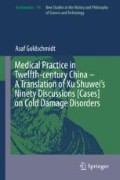Abstract
This case record is about distinguishing two similar syndromes. The patient presents symptoms which a certain physician diagnoses as an Immature Yin manifestation type of Cold Damage. Xu disagrees, and explains how to differentiate between the two syndromes Immature Yin and Immature Yang. The two share a common symptom, sweating from the head. In the former, profuse sweating has led to collapse of the yang qi. The chance of survival from this condition, according to the Treatise and Xu, are poor. The second condition, much milder and more common, is what Xu presents in this case record.
Access this chapter
Tax calculation will be finalised at checkout
Purchases are for personal use only
Notes
- 1.
This symptom appears under various names including ‘reversal cold in the arms and legs’ (shouzu jue leng 手足厥冷), ‘counterflow cold in the four limbs’ (sizhi ni leng 四肢逆冷), ‘counterflow cold in the arms and legs’ (shouzu ni leng) 手足逆冷, ‘reversal counterflow’ (jue ni 厥逆). They all refer to cold feeling in the arms and legs often reaching to the elbow and knee. See Zhongyi da cidian, 2nd ed., p. 303.
- 2.
Those symptoms, taken alone, would have indicated Immature Yin.
- 3.
The version of the case recorded in Puji benshi fang has fei 非 instead of wei 為 changing the meaning from ‘is’ to ‘is not the case.’ Depletion Bind is a Bind disorder, sometimes indicating accumulation, due to depletion. Since Xu does not state what is depleted in which system of functions and what is binding, it is unclear what exactly he meant by this.
- 4.
See Scheid et al. 2009, pp. 104–109.
- 5.
A similar though not identical discussion appears in Xu’s Shanghan fawei lun, p. 47–48.
- 6.
- 7.
These two characters “了了” have two possible meanings in the Treatise. The first is to ‘be fit’ or ‘to recover’ (傷寒論•辨太陽病脈證并治, line 27, Yu 1997, p. 59), and the second is ‘to be clear-sighted’ (傷寒論•陽明病篇, line 82, Yu 1997, p. 73). Xu is quoting a sentence in which its sense is the first. See Zhongyi da cidian, 2nd ed., p. 53.
- 8.
- 9.
Yang Failure (亡陽) is a disorder in which the yang qi is exhausted. See Zhongyi da cidian, 2nd ed., p. 135.
- 10.
This is a quotation from the Treatise (平脈法, line 15), see Yu 1997, pp. 24.
- 11.
Xu adapts a sentence from the Mencius (Mengzi) 9.4 (萬章上), pp. 198–199. It reads: “When you expound the Book of Songs, don’t let the words hide the sentence, and don’t let the sentence obscure the meaning. Use your reasoning to fathom [the poem’s] intention. That is how you get it. 故說詩者,不以文害辭,不以辭害志,以意逆志,是為得之。” Ni 逆, which in most writings means “to go against,” in this Mencius passage means “to determine, to fathom.” Contemporary readers would have understood Xu’s point, the need for critical thinking.
Bibliography
Other Sources:
Mitchell, Craig, Feng Ye, and Nigel Wiseman. 1999. Shang Han Lun (On Cold Damage); Translation and Commentaries. Brookline, MA: Paradigm Publications.
Scheid, Volker, Dan Bensky, Andrew Ellis, and Randall Barolet. 2009. Chinese Herbal Medicine: Formulas and Strategies. Seattle: Eastland Press.
Yu, Bohai 于伯海, et. al. 1997. Shanghan jinkui wenbing mingzhu jicheng 伤寒金匮温病名著集成 [Collected Famous Works on Cold Damage, Golden Casket, and Febrile Disorders]. Beijing, Huaxia chubanshe.
Author information
Authors and Affiliations
Rights and permissions
Copyright information
© 2019 Springer Nature Switzerland AG
About this chapter
Cite this chapter
Goldschmidt, A. (2019). Case Number 79. In: Medical Practice in Twelfth-century China – A Translation of Xu Shuwei’s Ninety Discussions [Cases] on Cold Damage Disorders. Archimedes, vol 54. Springer, Cham. https://doi.org/10.1007/978-3-030-06103-6_80
Download citation
DOI: https://doi.org/10.1007/978-3-030-06103-6_80
Published:
Publisher Name: Springer, Cham
Print ISBN: 978-3-030-06102-9
Online ISBN: 978-3-030-06103-6
eBook Packages: MedicineMedicine (R0)

